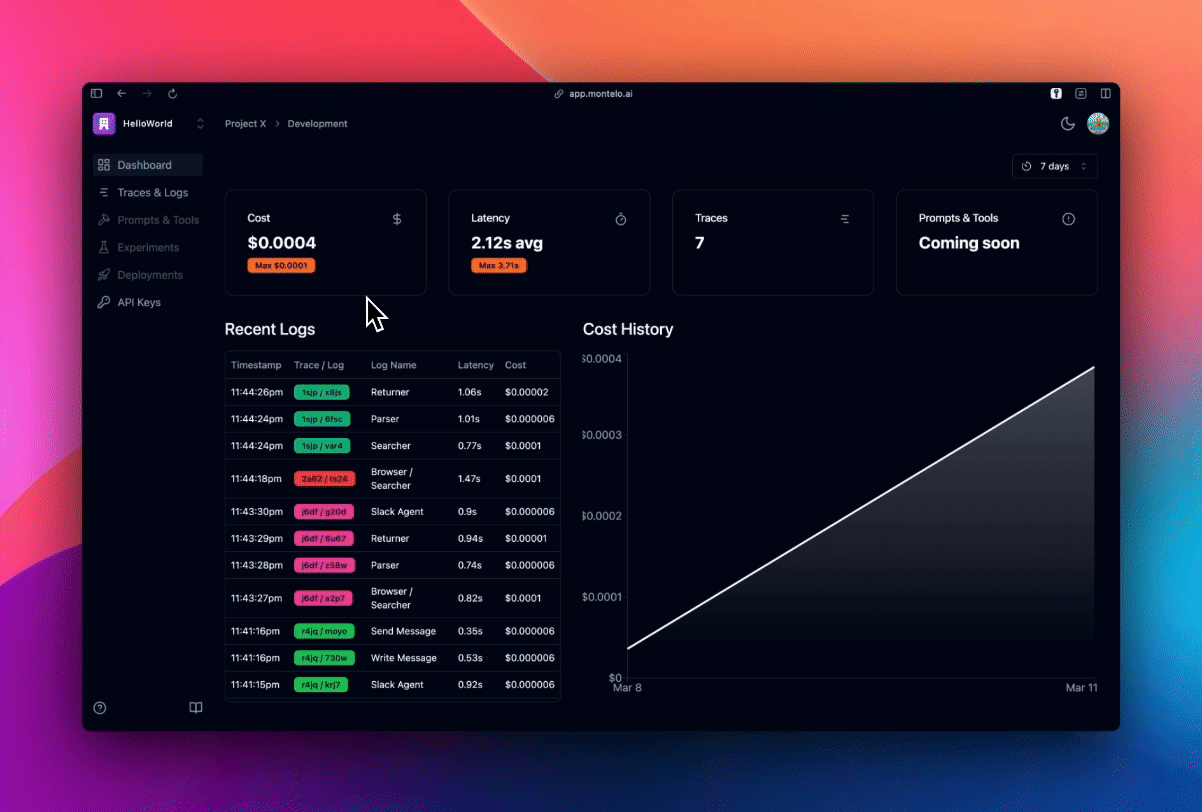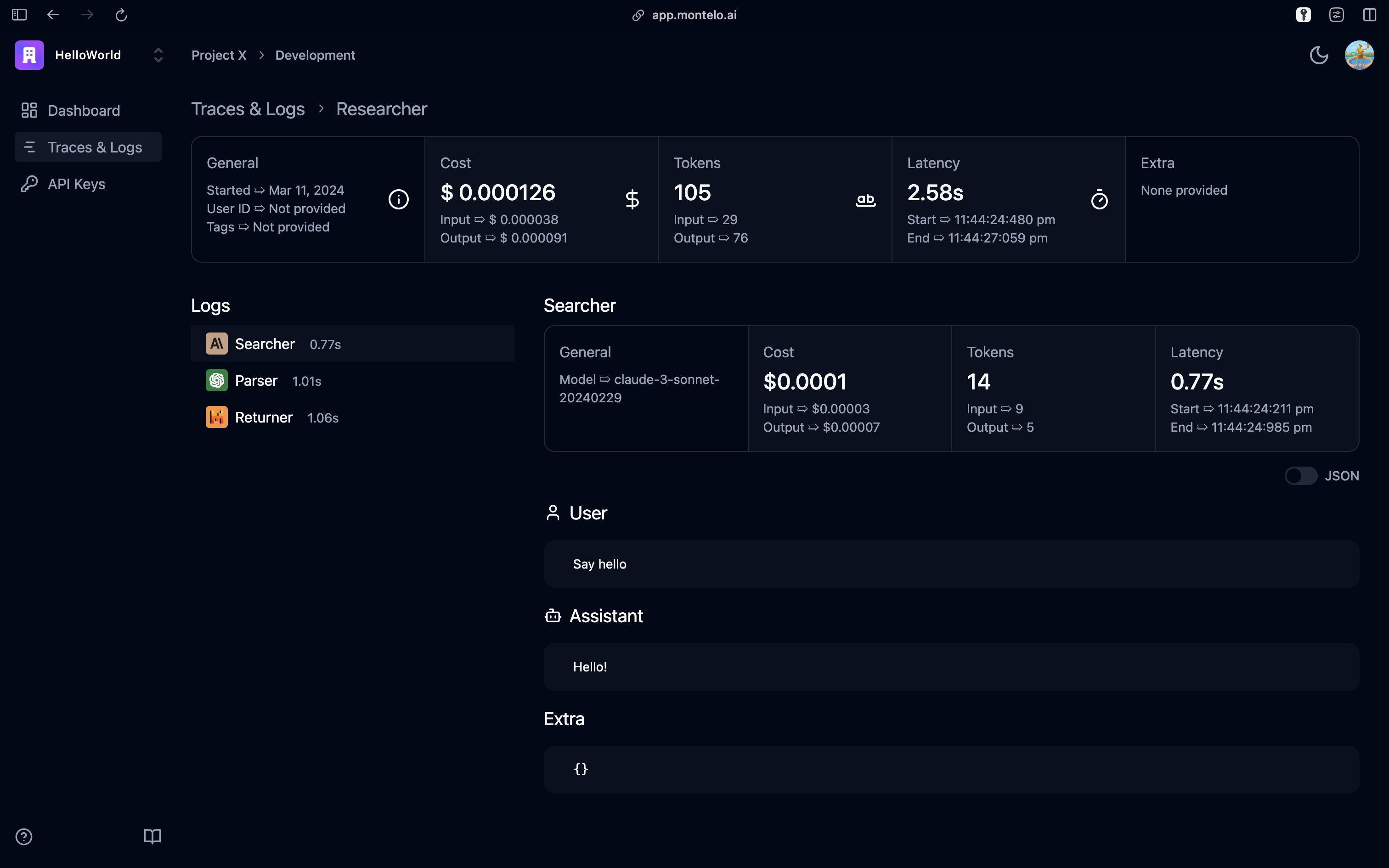Monitoring LLMs with Montelo & the Vercel AI SDK
 Deactivated User
Deactivated User
The Vercel AI SDK is a library designed to help developers build conversational streaming user interfaces in JavaScript and TypeScript. It makes it really easy to build ChatGPT-like interfaces.
If you haven't already, read the docs or watch this video 👇 on setting up the Vercel AI SDK.
What it doesn't do
The AI SDK doesn't store any of the requests for you out of the box. There is a guide on saving the result of a completion to a database after streaming it back to the user.
You can manually do it like this:
export async function POST(req: Request) {
// ...
// Convert the response into a friendly text-stream
const stream = OpenAIStream(response, {
onStart: async () => {
// This callback is called when the stream starts
// You can use this to save the prompt to your database
await savePromptToDatabase(prompt);
},
onToken: async (token: string) => {
// This callback is called for each token in the stream
// You can use this to debug the stream or save the tokens to your database
console.log(token);
},
onCompletion: async (completion: string) => {
// This callback is called when the stream completes
// You can use this to save the final completion to your database
await saveCompletionToDatabase(completion);
},
});
// Respond with the stream
return new StreamingTextResponse(stream);
}
But you'll have to setup a database, figure out a schema, deploy it, write to it, debug it, maintain it, and more 🥱
There's an easier way.
MonteloAI
MonteloAI is the LLM DevOps platform for TypeScript. With one simple code change, Montelo will automatically log all your requests to a beautiful dashboard where you can track latency, cost, and token usage.
To get started, follow the steps below.
Create an account and a project
Visit Montelo to create a (free) account.
Get And Set Your API Key

Visit your project's dashboard and get it's API key. Set it in your .env as MONTELO_API_KEY.
MONTELO_API_KEY=sk-...
Install Montelo
Back to your IDE, install Montelo.
npm install montelo
Replace OpenAI With Montelo
Switch out new OpenAI() with new Montelo().
// import OpenAI from 'openai';
import { Montelo } from 'montelo';
// const openai = new OpenAI();
const montelo = new Montelo();
Then switch out all openai calls to montelo.openai .
// ❌
// const response = await openai.chat.completions.create({
// model: 'gpt-3.5-turbo',
// messages,
// });
// ✅
const response = await montelo.openai.chat.completions.create({
model: 'gpt-3.5-turbo',
messages,
})
And you're done! You should now be able to see all your logs on the dashboard 🚀

Montelo currently supports OpenAI, Mistral, and Anthropic.
Here's the complete example:
// src/app/api/chat/route.ts
import { Montelo } from 'montelo';
import { OpenAIStream, StreamingTextResponse } from 'ai';
import { NextResponse } from 'next/server';
// Create a Montelo client (that's edge friendly!)
const montelo = new Montelo();
// IMPORTANT! Set the runtime to edge
export const runtime = 'edge';
export async function POST(req: Request) {
try {
const { messages } = await req.json();
// Ask Montelo for a streaming chat completion given the prompt
const response = await montelo.openai.chat.completions.create({
name: 'chat',
model: 'gpt-3.5-turbo',
stream: true,
messages,
});
// Convert the response into a friendly text-stream
const stream = OpenAIStream(response);
// Respond with the stream
return new StreamingTextResponse(stream);
} catch (error) {
if (error instanceof OpenAI.APIError) {
const { name, status, headers, message } = error;
return NextResponse.json({ name, status, headers, message }, { status });
} else {
throw error;
}
}
}
For the full repo:
Subscribe to my newsletter
Read articles from Deactivated User directly inside your inbox. Subscribe to the newsletter, and don't miss out.
Written by

